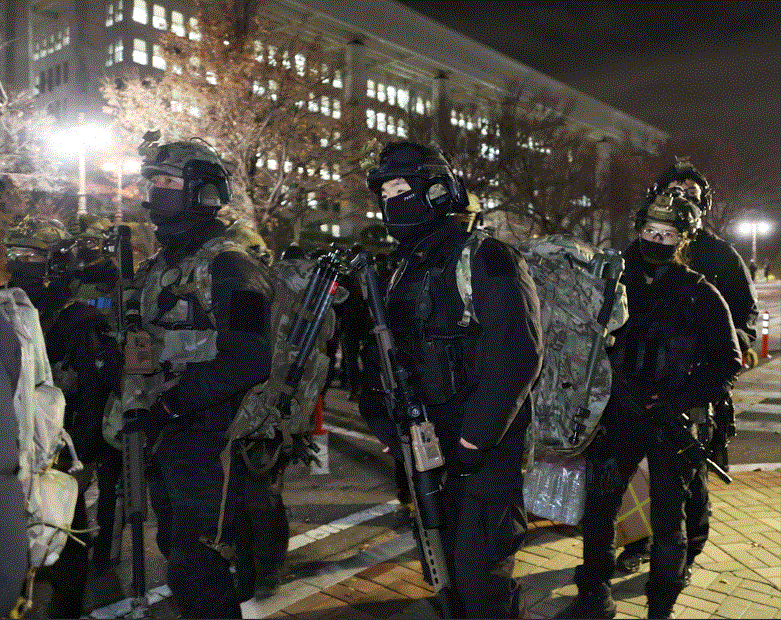South Korea parliament rejects president's martial law declaration

SEOUL —President Yoon Suk Yeol declared martial law on Tuesday night, creatingthe most serious challenge to South Korea's democracy since the 1980s as lawmakers rejected the move in a vote and protesters gathered outside parliament.
Yoon's declaration, which he cast as aimed at his political foes, was vocally opposed by the speaker of parliament and even the leader of Yoon's own party, Han Dong-hoon, who has clashed with the president over his handling of recent scandals.
Under South Korean law, the president must immediately lift martial law if parliament demands it by a majority vote.
Live television footage showed helmeted troops apparently tasked with imposing martial law attempting to enter the National Assembly building. Parliamentary aides were seen trying to push the soldiers back by spraying fire extinguishers.
Yoon said in a TV broadcast that opposition parties had taken the parliamentary process hostage. He vowed to eradicate "shameless pro-North Korean anti-state forces" and said he had no choice but to take the measure to safeguard constitutional order.
"This declaration is illegal and constitutes a criminal act, directly violating the Constitution and other laws," the opposition Democratic Party said in response.
"It is essentially a coup d'état," it said.
Shortly after Yoon made his announcement, people began gathering outside the parliament building, some of them shouting: "Withdraw emergency martial law!"
"Arrest Yoon Suk Yeol" shouted others.
Demonstrator Im Jin-soo, 66, said he asked his children to stay at home out of concern for their safety but he came to protest outside the parliament after seeing the news.
"I am so angry, I am beyond confused," he said. "I came out to protect democracy. During the dictators we couldn't rise up, but now we can."
After Yoon's statement the military said activities by parliament and political parties would be banned, and that media and publishers would be under the control of the martial law command.
Yoon did not cite any specific threat from the nuclear-armed North, instead focusing on his domestic political opponents. It is the first time since 1980 that martial law has been declared in South Korea.
South Korea has had a series of authoritarian leaders early in its history but has been considered democratic since the 1980s.
The Korean won KRW= was down sharply against the U.S. dollar. A central bank official said it was preparing measures to stabilise the market if needed. Finance Minister Choi Sang-mok has convened an emergency meeting among top economic officials, his spokesman said in a text message.
U.S. Deputy Secretary of State Kurt Campbell said the United States was watching events in South Korea with "grave concern" and hoped that any political disputes would be resolved peacefully and in accordance with the rule of law.
He stressed that the U.S. alliance with South Korea was "ironclad", adding: "We stand by Korea in their time of uncertainty."
Some 28,500 U.S. troops are stationed in South Korea to guard against the North. A spokesman for the U.S. military command did not answer repeated phone calls.
Won plunges against the US dollar after Korea martial law declaration, —Reuters




